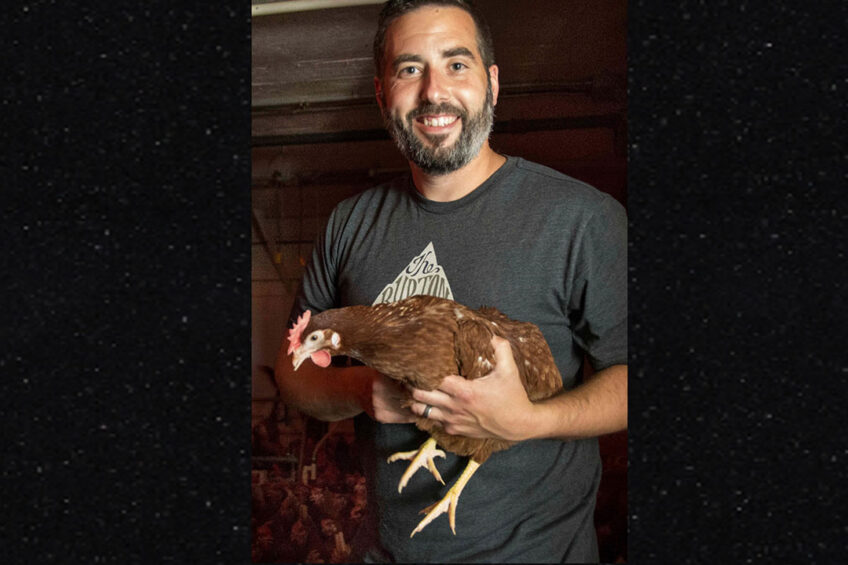Different ways to farm eggs

Canadian Jon Krahn was selected for the Young Egg Leader programme of the International Egg Commission. One year into the programme he shares his experience with Poultry World.
A few years ago the International Egg Commission (IEC) launched its Young Egg Leader (YEL) initiative to bring on the next generation in the global egg industry.
International egg industry networks
Participants are drawn from families worldwide who own egg farms or processing businesses. They must already be involved in the family business at a senior level. A new cohort of 6-8 trainees is welcomed into the 2-year programme every year in April. Each new group connects with the previous year’s entrants and, during the second year, with the next incoming group, leading to the creation of individual international egg industry networks.
A better understanding of today’s egg industry
During the programme YEL participants benefit from industry presentations, leadership seminars and roundtable discussions. They learn about the global egg industry (e.g. economic overview, spatial analysis and regions of rapid development) and the various organisations besides the IEC that help promote global egg consumption.
It’s hoped that participation leads to a better understanding of the scope and challenges of today’s egg industry and that some participants will one day become members of the IEC board and related committees. Participants can also access mentoring from senior egg industry figures and partner organisations involved with the programme.
Egg farming since 1951
A total of 7 YEL participants were welcomed in 2020, including Jon Krahn of Paragon Farms and the Paragon Feed Corporation in Abbotsford, British Columbia, the western-most province of Canada. The Krahn family started egg farming in 1951 and over the years expanded their business to include broiler and turkey production.

In 1996, the Krahns started Paragon Feeds Corp. which markets conventional and organic feed for broilers, pullets, layers and turkeys, as well as ‘scratch’, which is a mix of wheat and corn that encourages natural pecking. Krahn currently holds the title of production manager at Paragon Feeds.
“My dad and uncle started the mill because they wanted to control costs and also offer a dependable source of excellent nutrition,” he explains. “We produce both conventional and organic poultry feed and have recently added a bagging line for our small flock customers.”
Previous programme experience
Krahn had already taken part in the Young Farmers Program of Egg Farmers of Canada (EFC) in 2016 and says the programmes are very similar in many ways. He was nominated for YEL by EFC and was very happy to hear that he was accepted for 2020. “I have the opportunity to build relationships with young leaders from around the world, share best practices and more,” he says. “It’s quite some honour.”
![]() The who’s who in the global poultry sector talk to Poultry World…
The who’s who in the global poultry sector talk to Poultry World…
For more interviews, click here
Normally, along with other activities, YEL participants attend the 2 IEC annual conferences held every April and September. However, with the arrival of Covid-19, 2 online events have been held for YEL members so far. “It’s very refreshing to hear what’s going on around the world, to meet all these other farmers, even virtually,” says Krahn.
“We discussed some of the challenges facing the egg industry, such as diseases, the rise of vegan food consumption and animal rights activists…”
“At the first event we were just basically introducing ourselves and getting to know each other. At the second, we discussed some of the challenges facing the egg industry, such as diseases, the rise of vegan food consumption and animal rights activists, as well as strategies for educating the public about eggs – how to get the message out there that eggs are a very sustainable, safe, affordable and nutritious high-protein food. But I think the real kick-off for our group will be when we meet in person. It’s up in the air what will happen with that but I’m hoping an in-person meeting will be possible.”
Market trends
For his own development during the programme, Krahn wants to learn about different ways to farm eggs, farming trends around the world and more about the market challenges in other countries.
“Here in Canada, the gradual removal of conventional cages is continuing and that’s a trend that’s happening in many other countries, too. In our egg barns we finished converting all our conventional cages to ‘enriched’ housing in late 2020 and we also have some free-run barns as well,” he notes.
Role of eggs highlighted at UN Food Conference
Worldwide, 2 million egg farmers provide accessible, affordable and sustainable nutrition. Read more…
Eating lots of eggs at home
While the hospitality and food service sector in Canada and other countries has been devastated due to the coronavirus pandemic, Krahn notes that Canadians are cooking and eating lots of eggs at home. Canadian table egg consumption grew in 2020, although egg consumption in Canada has grown every year for many years. Average per capita egg consumption in Canada was 253 in 2018 and 257 in 2019. The 2020 stats will be available soon.
A good selection of eggs
“Eggs are such an easy food and cook so quickly,” says Krahn. “They are very versatile as well. I think egg farmers in Canada and many countries around the world are doing a very good job of providing choice. In Canada, we offer white and brown, organic, Vitamin-D enhanced and omega fatty-acid enhanced. Specialty eggs are particularly popular in British Columbia compared to the rest of Canada.”
Staying involved
In the future Jon Krahn plans to continue on his present course, working in the family feed mill business and farming with his wife, Danielle, their 4 children and his other family members. He will also continue to serve within industry associations. He has previously served on the board of the BC Egg Producers Association and he now sits on the BC Egg Marketing Board where his father was its longest-serving director.
Poached eggs on toast
As he gains more YEL experience, Krahn will bring his insights and knowledge to this position and any others he may have in future. And his favourite way to have eggs? “Poached on toast,” he says. “When we have breakfast, now that the kids are bigger, we eat well over a dozen eggs, so thank goodness we live on an egg farm.”













